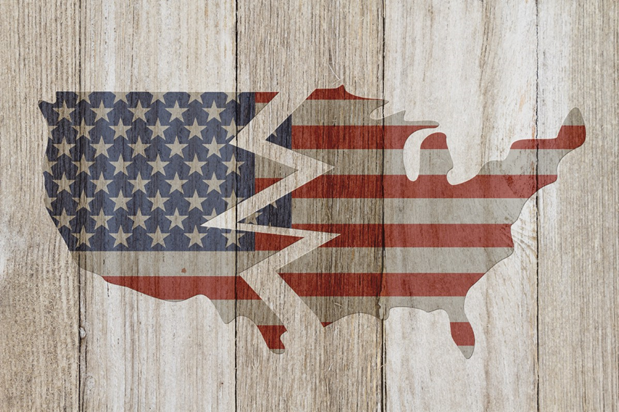We Did Germany and Vietnam, Now: Unite the States!
Saturday, February 23rd, 2019![The past generation has seen the reunification of a number of fractured states: Vietnam and Yemen (North & South), Germany (East & West) — to be fair: it has seen dissolutions as well, chiefly of the Soviet Union and of Yugoslavia. The former change, representatives of both the United Nations and the Office Furniture Division of Staples.com note, made no meaningful decorating difference at the UN — the Soviet Socialist Republics each having, nominally, “held their own seats.” The coming-together-of the Germanies, the Vietnams, […]](https://www.thesatirist.com/wp-content/uploads/2019/02/Unite-the-states-300.png)
The past generation has seen the reunification of a number of fractured states: Vietnam and Yemen (North & South), Germany (East & West) — to be fair: it has seen dissolutions as well, chiefly of the Soviet Union and of Yugoslavia.
The former change, representatives of both the United Nations and the Office Furniture Division of Staples.com note, made no meaningful decorating difference at the UN — the Soviet Socialist Republics each having, nominally, “held their own seats.” The coming-together-of the Germanies, the Vietnams, and the Yemens, by way of contrast, according to the same sources, was actually a useful counterweight to the dissolution of Yugoslavia, obviating the need for additional furniture purchases (or recycling) and the, inevitably contentious and potentially violent, reconfiguration of diplomatic space.
Those international shifts and changes, however, have left the United States in the — awkward! — position of being host to many or most of the remaining “fissured spaces” on the map: The Dakotas and The Carolinas (North & South), Virginia (West & Not) — never mind secessionist rumblings in Southern New Jersey and Eastern (and/or Northern) California.
President Trump has announced that it is one of his goals, in the final year of his presidency, to “heal these wounded and sundered parts of our national tapestry, to bring Americans together, North and South, West and . . . Not.”

Speaker of the House Nancy Pelosi, perhaps predictably, has denounced these plans as, “another hapless foray into border adjustment, that undermines the integrity of our Great Nation and the sacred principles of local control and autonomy,” and pledged to do everything in her power to block the president.
In The Broken States, opinions are mixed.
“I would feel better about this if they spoke English in South Carolina,” said one NC partisan who declined to give her name. “I’m just not sure that it makes sense for us to try to unite with a place that doesn’t speak the same language we do.”
“She’s a fucking moron,” retorted her — also anonymous — SC counterpart. “Don’ even wanna try, fuckin’, unnerstan’ we all — damn right! — ain’t gonna no how never anyway. No. No! No! Know whatta mean? Ain’t complicated! Not really. Flag! Fort-Fuckin’-Sumter-Tell-Ya-What!”
“Look,” said John Squatting Squirrel, a Native American, born in South Dakota, patience visibly fraying, “those people Up There? They’re not Real Dakotans! And I’m not even talking Lakota Sioux — that’s a whole other ball o’ wax. Ask me? They’re more like Norwegian-Canadians! And it’s — people don’t pay enough attention to this but — that’s a porous border up there, too: Canada’s the goddamn Mexico-of-the-Northern-Tier. I don’t need any more of those Really-Really-White-People coming down here, bringing me Tim Horton’s, hockey, and How’s it, eh? I got enough problems — historical and current — with the White People we already got. Don’t even get me started on the Germans! Just . . . don’t.”
Virginia State Senator Clayton Howely was succinct in his response to the question of reunification.
“No,” he said, and then patted the general area of his armpit, under a slightly bulgy sport jacket, which pretty clearly signaled the end our conversation.
“Are you sure we’re not part of Virginia?” asked West Virginia high school history teacher Rory Barnes, scratching his head vigorously. “I mean . . .” he stopped talking for-a-good-little-while, and then, “Virginia’s like . . . it’s, y’know. It’s part of the name of the state. Are you sure about this?”
Throat-clearing — and a timely exit — seemed the best response.
“The internal affairs of member countries are not to be interfered with,” said UN Secretary General Ban Ki-moon, sounding a little rote and depressed, “unless there are human rights violations at a level that, as a matter of international law, require action.”
When asked about recent — increasingly deadly — environmental catastrophes in West Virginia, which seemed to signal the need for outside intervention, for humanitarian aid, or for adult supervision, at the very least, Secretary Ban simply said: “Oy!” keeping his head in his hands until his assistant (apparently) gave a sign that I had given up and was leaving.
He peeped through his fingers, briefly, as I exited.
He may have been crying.
I can’t really be sure.
 0 comments
0 comments


